The African Mental Health Research Initiative II (AMARI-II) is inviting applications for its prestigious Post-Doctoral Fellowship program for the 2024/2025 academic year. This initiative represents a significant effort to advance scientific excellence in mental health research across Africa. By focusing on mental, neurological, and substance use (MNS) disorders, AMARI-II seeks to address the critical treatment gap in mental health care on the continent through innovative research, intervention development, and community engagement.
About the AMARI-II Fellowship Program
AMARI-II is part of the broader Developing Excellence in Leadership, Training, and Science in Africa (DELTAS Africa) initiative, which is funded by Wellcome and the UK’s Foreign, Commonwealth & Development Office (FCDO) under the Science for Africa Foundation (SFA). The program’s mission is to cultivate a new generation of African researchers equipped to lead transformative projects in Global Mental Health (GMH), thereby improving access to quality mental health care and interventions tailored to African contexts.
Purpose and Goals
The primary objectives of the AMARI-II Post-Doctoral Fellowship include:
- Building Scientific Excellence: Strengthen the capacity of African researchers in the field of MNS disorders by offering specialized training in research methodologies and advanced data analysis.
- Enhancing Leadership and Mentorship: Provide fellows with skills in research leadership, project management, and mentorship, fostering a culture of academic excellence and sustainability.
- Developing Community-Based Interventions: Support the creation and implementation of culturally appropriate and scalable interventions to address mental health challenges, particularly in under-resourced settings.
Fellows will collaborate with leading universities in Africa and the UK, gaining access to world-class mentorship, resources, and a network of like-minded scholars dedicated to improving mental health outcomes across Sub-Saharan Africa.
Eligibility Criteria
Applicants must meet the following requirements:
- Possess a PhD in a mental health-related discipline (e.g., Global Mental Health, Psychiatry, Psychology, Neuroscience, Public Health, or equivalent), completed within the last four years.
- Demonstrate a strong personal motivation to advance research in mental, neurological, and substance use disorders.
- Have a proven track record of research or professional experience in mental health or related fields.
- Show potential for independent research and academic leadership.
Fellowship Benefits
Selected fellows will receive a comprehensive support package, including:
- Tuition Coverage: Full payment of tuition fees for the post-doctoral program.
- Research Support: Access to mentorship from experienced faculty members and funding for a well-defined research project.
- Stipend: A monthly allowance to cover living expenses.
- Travel Grants: Financial support for attending relevant conferences, workshops, and specialized training sessions.
Research Focus Areas
AMARI-II encourages research projects that tackle critical challenges in mental health. Priority areas include:
- Intervention Development: Exploring the acceptability, feasibility, and effectiveness of culturally sensitive mental health interventions.
- Diagnostic Tools: Validating and adapting mental health assessment tools to suit African cultural and socio-economic contexts.
- Social Determinants: Investigating the impact of social determinants such as poverty, education, and stigma on mental health outcomes.
- Pandemic Impact: Studying the long-term effects of COVID-19 on mental health and healthcare systems in Africa.
- Capacity Building: Identifying strategies to support early-career researchers in establishing sustainable and independent research careers in mental health.
Application Process
To apply for this transformative opportunity, candidates must submit the following documents:
- A completed application form (request the form via email).
- A comprehensive CV detailing academic qualifications, research experience, and professional achievements.
- Certified academic transcripts and copies of all post-secondary qualifications (compiled into a single PDF).
- A certified copy of the applicant’s passport or an equivalent identity document.
- Two academic references, sent directly by referees to the program’s email address.
Submission Details
All application materials must be submitted by 31st December 2024 to the following address:
Postal Address: University of Ghana
School of Public Health
Department of Social and Behavioral Sciences
P.O. Box LG 13
Accra, Ghana
Email: amariugsph@gmail.com
Incomplete or late applications will not be considered.
Additional Information
- Successful applicants will register for their studies at the University of Ghana.
- Fellows are expected to participate in workshops and summer schools focusing on cutting-edge research methodologies.
- Previous involvement in mental health research projects or programs is considered advantageous.
Why Apply?
The AMARI-II Post-Doctoral Fellowship offers a unique platform for African scholars to:
- Contribute to groundbreaking research addressing the urgent need for effective mental health interventions in Africa.
- Gain world-class training and mentorship in global mental health.
- Join a vibrant network of researchers committed to reducing the mental health treatment gap.
- Shape policies and practices that promote sustainable mental health systems across the continent.
This fellowship is not just an academic opportunity; it is a chance to be part of a movement transforming mental health care in Africa.
For further inquiries or to request the application form, please contact amariugsph@gmail.com. Don’t miss this opportunity to make a meaningful impact on mental health research and practice in Africa!



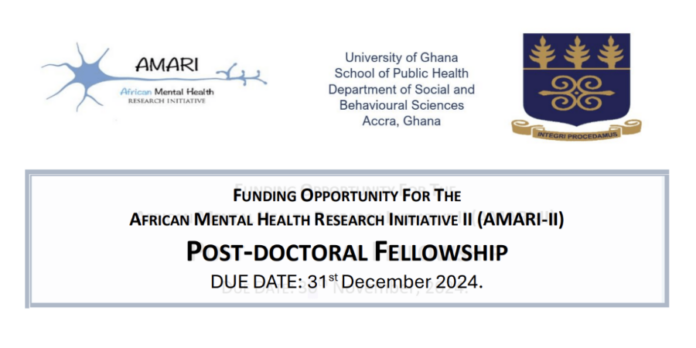
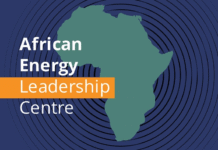



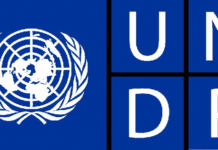

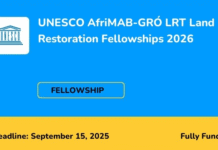

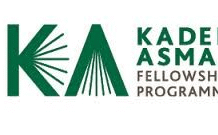



 The African Research (AR) Index is a comprehensive scholarly directory and database focused explicitly on journal publishers that publish and disseminate African research.
The African Research (AR) Index is a comprehensive scholarly directory and database focused explicitly on journal publishers that publish and disseminate African research.

